Those Who Stood Up and Signed: Part 14
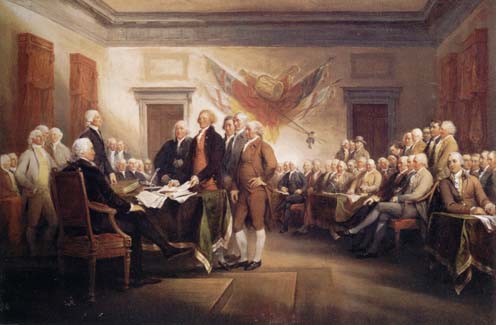
I still remember how our Social Studies in high school drilled into our minds how the signers of the Declaration of Independence were risking their lives signing that document. That they were, yet they were not going to allow themselves to be bullied to by any music celebrity, actor, anyone who considered themselves “royalty”, or anyone regardless of their religious beliefs, sexual preferences, country of origin or gender.
Much like their world, in today’s world, standing up for a certain political view can get you seriously injured or killed. Neither side has a monopoly on peace or love. If you dare defy an anti-Trump protester one can get seriously hurt, injured, tortured on Facebook, or killed. The events in Charlotte, NC have shown us that that evil organization, the KKK is still active too.
I want us to better understand these 56 men who were willing to risk everything for their country. So, in the following weeks, I am going to tell you about them, in alphabetical order mostly. I am not sure how many weeks it is going to take. I guess it will be based on how much I can actually find out about them as individuals.
Most of the biographical information will be taken from The Society of the Descendants of the Signers of the Declaration of Independence which gives extensive bios of each of the signers. Here, I shall highlight some of the parts of their lives that showed their character and spirit.
William Williams (04/18/1731-08/02/1811) was what is known as a PK, preacher’s kid. He was planning on entering the ministry too, after graduating from Harvard at 20, but became a soldier during the French and Indian War. During the war he found the British snobby and hard to deal with and he returned from experience eager to be part of the independence movement. He married Mary Trumbull. Her brother was John Trumbull, who painted the painting above. He also prospered as a merchant in Connecticut and became involved in local politics, serving as a part of the Connecticut Assembly for 45 years. He attended the 2nd Continental Congress but arrived late and was not able to vote until August.
He once wrote to John Trumbull, “we must be strong in the Day of our approaching Conflict, & may the Lord of Hosts be on our Side & vindicate our righteous Cause agt our most unjust & more than Savage Foes.”
He was a man of great faith. During the war, he was active in Connecticut and lent his pen and purse and home to the cause. He spent his final years as a county judge in Connecticut. His brother-in-law could not leave him out of his most famous painting! “In the Rotunda of the U.S. Capitol hangs the famous Trumbull painting The Declaration of Independence. William Williams is shown standing on the right at the back of the room in a group of two, with a brown coat.”
James Wilson (09/14/1742-08/21/1798) was born in Scotland to a poor farming family, but that did not stop him from learning as much as he could. He studied hard and received scholarships to local universities. It seemed that he was going to be a minister, but he had other interests. In 1765 at the age of 23, he came to America. He taught Latin for a while in Philadelphia, but soon found himself studying law in the office of none other than John Dickinson. The Stamp Act was the major issue of the day, however, James was a loyalist, believing that the colonies owed allegiance to Britain. However, he continued to think long and hard about it and wrote, Considerations on the Nature and Effect of the Legislative Authority of the British Parliament. His affiliations with Benjamin Franklin and John Dickinson were very important to him finally voting for independence. After this, he worked on the constitution of the state of Pennsylvania. He was not fan of the Articles of Confederation and wrote the first draft of the Constitution. He was responsible for those famous first words, “We the People….”Later in life, he made some bad business decisions and was actually put in jail for a short time. He never recovered from his time in jail, mentally and emotionally and died soon after.
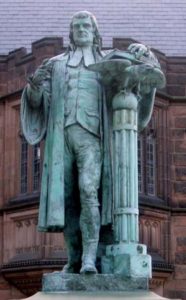 John Witherspoon (02/05/1723-11/15/1794) was a clergyman when he signed the Declaration. I am sure that his presence at the founding is a real conundrum for those today whose religion and life’s purpose is separating church and state. His father was also a clergyman and his father and his father, going all the way back to John Knox. John was born in Scotland and stayed there, eventually running his own church, until persuaded to come to America to lead the College of New Jersey by Benjamin Rush and Richard Stockton. So at the age of 45 he and his family moved to Philadelphia and eventually New Jersey. In 1774, he got involved in politics and eventually represented New Jersey at the Continental Congress and signed. One of his sons died in the Battle of Germantown in 1777. He worked tirelessly during the war to establish the country and after it, worked on the national Presbyterian Church and at the College of New Jersey. His wife passed away but he married another woman who was 44 years his junior. He worked hard on the abolition of slavery in the state of New Jersey.
John Witherspoon (02/05/1723-11/15/1794) was a clergyman when he signed the Declaration. I am sure that his presence at the founding is a real conundrum for those today whose religion and life’s purpose is separating church and state. His father was also a clergyman and his father and his father, going all the way back to John Knox. John was born in Scotland and stayed there, eventually running his own church, until persuaded to come to America to lead the College of New Jersey by Benjamin Rush and Richard Stockton. So at the age of 45 he and his family moved to Philadelphia and eventually New Jersey. In 1774, he got involved in politics and eventually represented New Jersey at the Continental Congress and signed. One of his sons died in the Battle of Germantown in 1777. He worked tirelessly during the war to establish the country and after it, worked on the national Presbyterian Church and at the College of New Jersey. His wife passed away but he married another woman who was 44 years his junior. He worked hard on the abolition of slavery in the state of New Jersey.
Oliver Wolcott (11/20/1726-12/01/1797) was from a long-line of Wolcotts that had a rich history. Oliver’s family history goes back to 1463 or 1382. So he had a lot to live up to. He graduated from Yale at the top of his class. Then he received a captain’s commission from Governor George Clinton of New York and fought in the French and Indian War. After that he became involved in local Connecticut politics as a Sheriff, an Assemblyman, and a Probate Judge. He was always fervent about the need for independence and he and his wife were Congregationalists and devoted Christians. He attended the 2nd Continental Congress, representing Connecticut. During the war, he was actively involved in the Connecticut Militia and rose to the rank of Major General.
His sincere faith in God and what he was doing was shown in the following letter to his wife “…..Whatever event may take place, the American cause will be supported to the last and I trust in God that it will succeed. The Grecian, Roman, and Dutch States were in their infancy reduced to the greatest distress, infinitely beyond what we have yet experienced. The God who governs the universe and who holds empires in His hand, can, with the least effort of His will, grant us all that security, opulence, and power which they have enjoyed……. May the Almighty ever have you and them in His protection!”
“Oliver Wolcott’s image is shown in the famous John Trumbull painting of the Declaration of Independence that hangs in the rotunda of the nation’s capital. Wolcott is the figure standing on the right in the far right center group of two standing delegates, just to the left of John Hancock.”
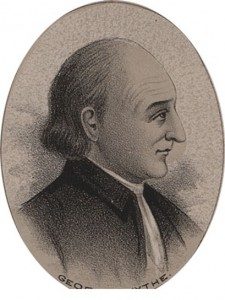 George Wythe (1726-06/08/1806) had a life that was truly fully of grief and sorrow and hardship. His father died when he was only 3 years old. Two of his wives died on him, the first one just seven months after marriage. He struggled in politics, frequently meeting those disagreed with him and who overturned all that he tried to accomplish. At the end of his life, he was poisoned. But he also had some lucky breaks. His mother homeschooled him and he had an uncle who taught him about the law. George passed the bar at only 20 years old and started his own practice. In Williamsburg, VA he got some clients who turned out to be famous. For example, he represented the Custis family, whose daughter Martha, married a man named George Washington.
George Wythe (1726-06/08/1806) had a life that was truly fully of grief and sorrow and hardship. His father died when he was only 3 years old. Two of his wives died on him, the first one just seven months after marriage. He struggled in politics, frequently meeting those disagreed with him and who overturned all that he tried to accomplish. At the end of his life, he was poisoned. But he also had some lucky breaks. His mother homeschooled him and he had an uncle who taught him about the law. George passed the bar at only 20 years old and started his own practice. In Williamsburg, VA he got some clients who turned out to be famous. For example, he represented the Custis family, whose daughter Martha, married a man named George Washington.
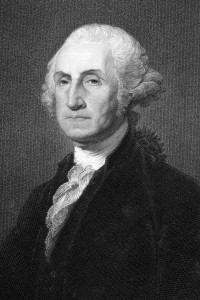 He got involved in politics around 1755 however, had considerable trouble getting re-elected. But as the Lord as different plans for us, he was chosen by the faculty of the College of William and Mary as their representative to the House. There he met a young man by the name of Thomas Jefferson. He also met another man by the name of Patrick Henry. He was elected Mayor of Wiliamsburg and was appointed as Virginia representative to both the 1st and 2nd Continental Congresses.
He got involved in politics around 1755 however, had considerable trouble getting re-elected. But as the Lord as different plans for us, he was chosen by the faculty of the College of William and Mary as their representative to the House. There he met a young man by the name of Thomas Jefferson. He also met another man by the name of Patrick Henry. He was elected Mayor of Wiliamsburg and was appointed as Virginia representative to both the 1st and 2nd Continental Congresses.
At the Congress, he was quoted as saying: “In what character shall we treat? As subjects of Great Britain? As rebels? Why should we be so fond of calling ourselves dutiful subjects? We must declare ourselves a free people.”
During the war, he helped create the foundations of the United States by arguing for a Constitution and working on the first law curriculum at William and Mary College. George Washington stayed with him and his 2nd wife. He worked tirelessly for the abolition of slavery, both his own slaves (even leaving them part of his estate in his will), and in the state of Virginia.
Romans 12:2 Do not be conformed to this world, but be transformed by the renewal of your mind, that by testing you may discern what is the will of God, what is good and acceptable and perfect.




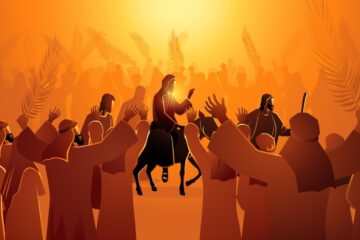

No Comment